Maher’s mockery misses the point
- Share via
There are three problems with Bill Maher’s new movie mocking faith: It misunderstands religion, misconceives God and gets human nature all wrong.
I have a fantasy of a counter-movie. I would travel around the world and interview every scientist with a crackpot theory or a quack cure. I’d find researchers who were venal, eccentric, foolish or cruel, throwing in a few responsible scientists for credibility. Call it, say, “Scientifictious.”
Of course, that would be no more convincing than “Religulous.” Religion is not univocal; there are lots of varieties and personalities. There is no shortage of strange beliefs and practices. There is ample opportunity for derision. Think of the movie he could have made about people’s eating habits.
What Maher seems not to know, or to understand, is that religion is not a fantasy flung upward but an intuition of something far greater than ourselves. Everyone who lives with open eyes has reason to question. In the search there will be missteps, even cruelties and division, but also sublimity, kindness, beauty, wonder and faith.
Perhaps Maher’s greatest misunderstanding of religion is his central indictment: that religion is responsible for the world’s violence. It is not. Violence is a product of human nature. Before monotheism, the Assyrians were not kind; the Romans were bloodthirsty beyond the imagination of religious regimes. When religion became less potent in people’s lives after the French Revolution, instead of making the world less violent, it became far more violent: World War I and WWII, communism, Nazism -- all shed blood on an unprecedented scale. None were religious regimes or religious wars.
Maher’s dislike of religion is not reasoned, however, but visceral. He told Mother Jones magazine about the Jews praying on his plane to Israel: “Even on the plane over, they were, at a certain point, they all stood up in the aisle of the plane davening [praying] ... they just looked like crazy people, always bowing their head. It’s disconcerting.” No doubt had they worn Armani suits and been tapping at a keyboard, Mr. Maher would have found them rational; but seeking transcendence in coach -- crazy.
If faith is, in part, the summit of our hopes, a guide and an aspiration, then what does Maher’s creed leave him with? Again, as he tells Mother Jones: “I’m telling you. I’ve got nothing.” It should not be hard to understand why someone might choose ancient wisdom over modern nihilism. It is not heroic to believe we are accidents of chemistry.
Maher’s view of human nature as essentially animalistic (he repeatedly wonders why anyone would curb their sexual appetites) is dispiriting and plain wrong. Animals we are, but we are much more than animals.
Maher misunderstands God as a projection of human need. This is a common atheistic trope -- your belief is based on psychological deficiencies, while mine is reasoned. In truth, the existence of God is not an antidote to fear but a consequence of wonder. God does not come about through faulty reasoning but through a worshipful and humble orientation of the soul.
“Religulous” repeatedly calls faith irrational. True, it is not a product of pure reason, but then what is, apart from mathematics? Reason does not get us out of bed, or move us to love or kindness. Religion is supported by reason, however. The marvel of values, ideas and consciousness -- nonphysical but powerful phenomena -- can reasonably be thought to have an origin in a nonphysical entity: that is, God. Centuries of people emboldened by, and ennobled by, faith can reasonably be thought to have something more than foolish illusions in their minds and hearts. Nevertheless, Maher calls religion a “neurological disorder.”
In study after study, religion proves to make people not just happier but more likely to give to charity and have stable marriages, to reduce drug and alcohol dependence and improve mental health. That does not make it true, but it is worthy of thought: Why should something so “irrational,” a mere “neurological disorder,” be so helpful to society?
Many of us suspect -- or yes, believe -- that there is more to the world than we know, that there is a mystery at its heart. That mystery may evoke some unworthy speculation, attract some charlatans, occasion some cruelties. Faith is also the spur for everything from the poetry of Psalms to the Cathedral at Chartres to relief missions. “Religulous” is one-dimensional. Religion is as varied and colorful as God’s blessed world.
David Wolpe is the rabbi of Sinai Temple in Los Angeles and the author of “Why Faith Matters.”
More to Read
Only good movies
Get the Indie Focus newsletter, Mark Olsen's weekly guide to the world of cinema.
You may occasionally receive promotional content from the Los Angeles Times.










